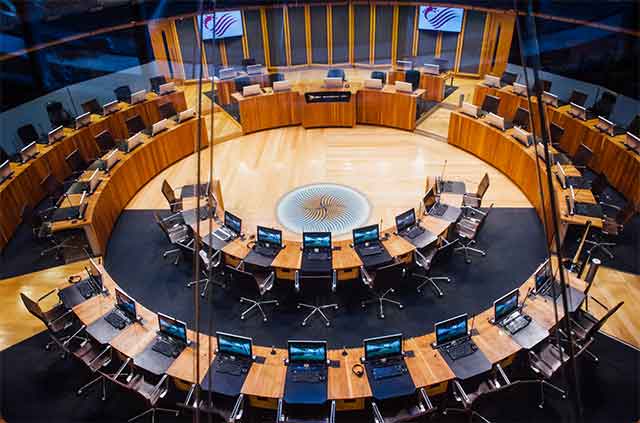Senedd officials pointed to “unavoidable” pressures and the need to make the Welsh Parliament fit for the future after unveiling a 16% budget increase.
The finance committee scrutinised the Senedd Commission’s £84.3m draft 2025/26 budget, which was unveiled last week and includes an extra £12.1m.
Hefin David described next year’s spending plans for the commission, which is responsible for support services and the Senedd estate, as a step change.
The commissioner responsible for the budget told the finance committee the size of the increase made some Senedd members “sit up and take note”.
Dr David said: “We’ve been tasked by a two-thirds majority to engage in Senedd reform and that was carried through a democratic vote. It’s now up to the parliament to decide whether … this should be funded in the way that we propose.
“My argument today is that there isn’t really any other way of doing it.”
‘Unavoidable pressures’
Dr David pointed to four key pressures on the draft budget for the 12 months from April:
- Senedd reform (£6.4m);
- the ‘Bay 2032’ project looking at offices as the Tŷ Hywel lease runs down (£2.4m);
- critical infrastructure projects (covered by a £1.5m project fund); and
- a 5% pay award for staff (£1.5m).
He raised the example of the Senedd’s automatic security gate failing, which will cost about £60,000 to replace, saying the cumulative costs of repairs would exceed that.
Dr David said: “These were unavoidable pressures that have led to this 16% increase to deliver a 60% increase in the size of the Senedd.”
Pressed about the terms of the lease on Tŷ Hywel, Ed Williams, director of resources, confirmed the Senedd is responsible for the cost of maintenance.
He said if the lease is not extended, the Senedd Commission would enter negotiations with the freeholder about splitting the cost of dilapidations before handing the building back.
‘Fit for the 2030s’
Dr David raised concerns about broken windows and cracks in the walls of some Senedd members’ offices in Tŷ Hywel.
He said: “What we really need to do is look at a parliament that is fit for the 2030s.”
Mike Hedges, a Labour member of the finance committee, advocated buying Tŷ Hywel, saying: “It’s always better to own than to lease.”
Asked about an 11% increase in the operational budget, Dr David said the 5% pay award is higher than the commission expected and reflects a wider rise in public sector wages.
“This is subject to negotiation as well,” he stressed. “Don’t forget that the trade unions still have a mandate for strike action within the commission.”
‘Dry sponge’
Dr David said critical infrastructure projects have been delayed in the past few years, with lift upgrades in the Senedd building estimated to cost £450,000.
Asked about an extra £900,000 to expand the debating chamber or Siambr for an extra 36 members from 2026, he said MSs bulked at the idea of House of Commons-style benches.
And, quizzed about any targets for in-year savings, the Labour backbencher pointed out that the commission has made cuts in the past two years.
He warned: “That sponge has probably been squeezed as dry as you’re going to be able to squeeze it, without having a direct impact on what members and the public see.”
Dr David said the commission chose not to cut members’ training and development, international travel, staff training, outreach, nor reactive maintenance.
“All of those things we could do – we could close the Senedd out of term time…,” he said, warning that such cuts would diminish the Senedd’s standing as a parliament.
‘Hierarchical’
Raising the example of Caerphilly Council’s plans to reduce its budget deficit, Mr Hedges asked whether the commission is similarly looking at flattening its structure.
Dr David argued that the commission “isn’t that hierarchical”, with a big band of researchers, clerks and legal experts in the middle.
He told the committee: “If you went through flattening the structure, you’d be going through redundancy programmes. Redundancy programmes cost money and you could end up rehiring these staff when Senedd reform happens.”
He said the commission employs 536 staff, with an increase of four over the past year to support the Senedd’s Covid-19 committee.
Dr David acknowledged Caerphilly Council’s announcement of a potential 600 job cuts from 9,000 staff, pointing out: “They haven’t been asked to do additional work … in fact, they are doing less.”
After the meeting, he added: “Caerphilly Council are doing an incredible job with scarce resources. They have had to repurpose funding to cover essentials like social care.
“They have also received more funding from the Welsh Government for additional projects. A strong Senedd will be able to support councils like Caerphilly in bidding for adequate funding.”

